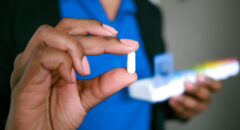 The first few weeks of pregnancy are critical to fetal development, so early prenatal care is important for having a healthy baby. The sooner you know you’re pregnant, the sooner you can begin making healthy choices about diet and nutrition, and limit your exposure to hazards.
The first few weeks of pregnancy are critical to fetal development, so early prenatal care is important for having a healthy baby. The sooner you know you’re pregnant, the sooner you can begin making healthy choices about diet and nutrition, and limit your exposure to hazards.
Dr. Mary Jane Minkin, clinical professor of Obstetrics and Gynecology at Yale University School of Medicine and a FIRST RESPONSE® spokesperson, offers her tips to help women who are trying to conceive have a healthy road to pregnancy.
· Behave Like You’re Already Pregnant. If you’re trying to get pregnant, start conditioning your body and changing any unhealthy lifestyle habits before you conceive. Use this time as motivation to eliminate unhealthy habits from your lifestyle such as alcohol consumption, smoking and any illegal drugs. Ample preparation will make the transition to expectant mom smoother.
· Know Your Body! The best time to start tracking your cycle is before you start trying to conceive. To help identify the 24-36 hours when you are most likely to conceive, use an ovulation test, like the FIRST RESPONSE® Unmistakable Yes/No Digital Ovulation Test. When directions for use are carefully followed, tests like these can help you get pregnant sooner.
· Stick to Your Fitness Schedule. Pregnancy is a marathon. Adopting a regular exercise routine now will help you develop the strength and endurance needed down the road. Stay active and develop a workout schedule to help you stay healthy.
· Boost Your Vitamin Intake. When preparing your body for pregnancy, it is important to get the proper vitamins and folic acid. 0.4 milligrams of folic acid daily are recommended. Folic acid has been found to be instrumental in helping to prevent neural tube defects (NTDs) which often develop before a woman knows she is pregnant. Iron is essential for making red blood cells and preventing anemia and fatigue. Make sure to choose a prenatal vitamin with a tolerable form of iron to reduce the possibility of constipation, bloating and nausea. Ensure you are getting the recommended levels of Calcium or Vitamin D needed to ensure a healthy conception and pregnancy.
· Get Strict About Your Diet. Follow a well-balanced diet containing food from all major food groups. Don’t diet, either to gain or lose weight, because this may affect your reproductive cycle.
· If you think you may be pregnant, take a pregnancy test as soon as possible. Technology has come a long way. For example, the FIRST RESPONSE® Early Result Pregnancy Test can detect the pregnancy hormone, hCG (human Chorionic Gonadotropin), 6 days before your missed period.







